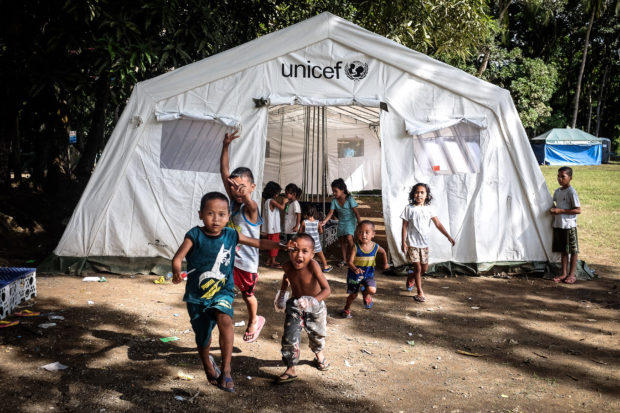A year after Marawi conflict, UNICEF says children still at risk
On the first anniversary of the terror attacks in Marawi City, the United Nations Children’s Fund (UNICEF) lamented that more children residing in the war-torn city were still at risk.
The UNICEF pointed out that over 100,000 children were reportedly displaced, and over 500,000 children were still at risk of becoming malnourished and unable to return to school.
But even before the conflict in Marawi escalated, the UNICEF revealed that the situation of the children in Lanao del Sur was already considered among “the worst in the country.”
“It is the poorest province in the country with well over 60 percent of families living in poverty and inadequate coverage of essential services in many parts of the province,” said UNICEF Philippines representative Lotta Sylwander.
“With many displaced families moving from Marawi City to other areas in Lanao del Sur (as well as to Lanao del Norte), the capacity of the province to provide essential services for children, and the capacity of host families to support their displaced relatives has been even further challenged,” she noted.
Article continues after this advertisementThe UNICEF also said that the families of around 500,000 children were displaced, and the children have been sharing their homes, food, personal belongings, and school materials with other children temporarily living with them.
Article continues after this advertisement“While recognizing the good progress made to assist over 40,000 families to return to their homes in Marawi City, many children’s lives are still far from returning to normal,” Sylwander said.
“A comprehensive approach is needed to focus not only children from Marawi City but for children in all of the 39 municipalities in the province,” she stressed.
With no livelihood and forced to sell their assets, the affected families have become “even poorer,” according to UNICEF.
“This has reduced quality and quantity of food intake for children and puts them at greater risk of malnutrition,” it said.
“UNICEF is concerned that without significant additional investments in community-based nutrition programs and cash support programs to restore household incomes in Lanao del Sur, the number of children malnourished will increase, including children with life-threatening severe acute malnutrition,” it added.
The UNICEF has been assisting children and families since the start of the conflict.
The organization has screened 40,000 children aged six to 59 months in evacuation centers, with 214 children with severe acute malnutrition referred to life-saving services.
It has also provided over 100,000 persons with sanitation and hygiene promotion, over 20,000 with improved access to clean water, and some 400,000 with essential water and sanitation and hygiene information though the mass media.
Moreover, it has assisted 35,000 children to return to school, including providing 6,500 children with essential learning materials./ee
RELATED VIDEO
